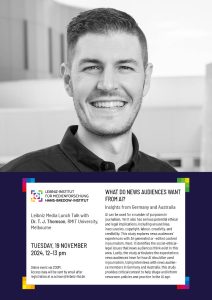For this Leibniz Media Lunch Talk we welcome Dr. T.J. Thomson, RMIT University, Melbourne. He will present a study that explores how news users experience AI-generated or AI-edited content in journalism. The study also captures users’ expectations of the use of AI and their views on ethical and legal issues.
Moderation: Prof. Dr. Wiebke Loosen. The event will be held in English.
When?
12-1 noon (CET)
About the Presentation
AI can be used for a number of purposes in journalism from brainstorming and enriching to optimising, editing, creating, and presenting. Yet it also has serious potential ethical and legal implications, including around bias, inaccuracies, copyright, labour, creativity, and credibility. Acknowledging this tension, this study first explores news audiences’ experiences with AI-generated or -edited content in journalism. Next, it identifies the social-ethical-legal issues that news audiences think exist in this area. Lastly, the study articulates the expectations news audiences have for how AI should be used in journalism and probes how comfortable they are with around two dozen specific use cases. Using interviews with news audience members in Germany and Australia, this study provides critical context to help shape and inform newsroom policies and practice in the AI age.
About Our Guest
Dr. T.J. Thomson is a senior lecturer at RMIT and an Australian Research Council DECRA Fellow. His research is united by its focus on visual communication. A majority of T.J.’s research centres on the visual aspects of news and journalism and on the concerns and processes relevant to those who make, edit, and present visual news. He has broader interests in digital media, journalism studies, and visual culture and often focuses on under-represented identities, attributes, and environments in his research. T.J. is committed to not only studying visual communication phenomena but also working to increase the visibility, innovation, and quality of how research findings are presented, accessed, and understood.



